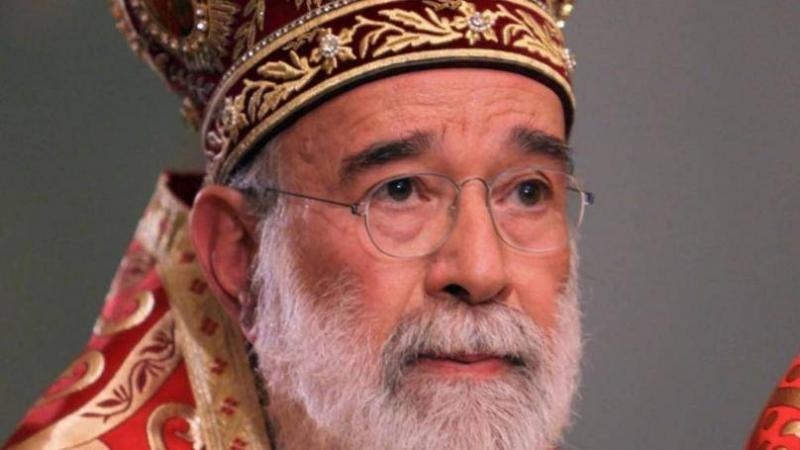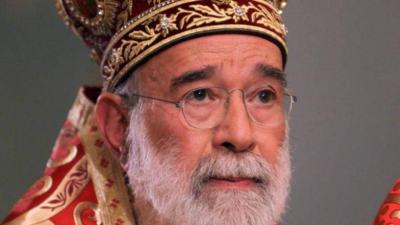Metropolitan Elias Audi of Beirut and its dependencies for the Greek Orthodox Church led the Divine Liturgy at St. George's Cathedral. After the Holy Gospel, Audi delivered a sermon in which he said: "Our holy church has dedicated the second Sunday after Easter to commemorate the women who brought spices, along with Joseph of Arimathea and Nicodemus, the nighttime disciple who contributed to the burial of the divine body. After the doubt of the Apostle Thomas, which we witnessed last Sunday, the church today emphasizes the courage shown by the spice-bearing women and the aforementioned men, whether in proclaiming the good news of the resurrection or in requesting the body of the Lord, preparing it for burial without taking into account the social status of Joseph or Nicodemus. Thus, we hear in the Funeral Service of Christ: 'The disciples had lost their courage, but Joseph of Arimathea showed boldness and nobility, for when he saw the Lord of all dead and naked, he requested and prepared him.' Likewise, during the Paschal period, we chant in honor of the spice-bearing women saying: 'The women who were with Mary went before dawn and found the stone rolled away from the tomb, and they heard the angel saying to them: Why do you seek the living among the dead? Look at the wrappings, hurry, and proclaim to the world that the Lord has risen and has vanquished death, for he is the Son of God, the Savior of mankind.' This hymn, which encapsulates the Gospel passage we heard today, highlights the important missionary work done by the spice-bearing women. Therefore, the church echoes this passage in our ears throughout the forty-day Paschal period, to encourage us to embody the boldness of those women and not to withhold the good news of salvation only for ourselves."
He added, "The spice-bearing women, driven by a longing that ignited their souls, did not care about external dangers; they went to the Lord's tomb to anoint his deceased body. They did not heed their logic, but rather their hearts filled with love for Christ. In the end, that which they sought as dead, while weeping, they worshiped as a living God, as we heard in the glorious Paschal proclamation. Thus, they became bearers of the good news to the apostles, the first heralds of Christ's resurrection. They were empowered by a love that conquers death, a love found only in the hearts of the humble. They served Christ (with their possessions) (Luke 8:3) because they saw true life in him and in his words. Of course, his death shook them, but they did not forsake the Lord or think he was misleading, and before they knew the certainty of the resurrection, they served the dead body. This means they transcended the worldly and human logic, understanding that true life is not in preserving the biological existence of a person, thus they were given the knowledge of the resurrection of the body through experience, for they witnessed the crucified Christ standing."
He continued, "On the other hand, the Apostle Peter fell into the abyss of self-confidence and reached the point of denying Christ, despite being the disciple whom he loved dearly. When Christ said to his disciples on the night of his arrest: 'All of you will be made to stumble because of me this night,' Peter did not grasp the prophetic words of the Lord but distinguished himself from the other disciples, objecting: 'Even if all are made to stumble, I will not be' (Matthew 26:33). His passion for Christ was tied to his absolute self-confidence, but as difficulties mounted, he 'denied Christ with an oath, saying I do not know the man' (Matthew 26:72). Today, we hear in the Gospel passage that the angel who proclaimed the resurrection to the spice-bearing women told them: 'Go and tell his disciples, and Peter, that he goes before you to Galilee; there you will see him.' Thus, it was revealed to the courageous spice-bearing women that God accepted the repentance of Apostle Peter, and he sent them to announce his salvation and acceptance of his repentance. Peter, whose self-confidence transformed into humility, and whose pride drowned in bitter tears of repentance, returned to the rank of the apostles to later become a bold preacher of the Gospel."
Audi said, "The greatness of the spice-bearing women is shown by their liberation from the difficult circumstances surrounding them. Their love for Christ was not influenced by his painful death, nor by the hatred of the scribes, the Pharisees, and the leaders of Israel toward him. Their courage granted them freedom and independence amid great sorrow. The spice-bearing women and Apostle Peter lead us to the path of true freedom, based on courage, just as true love conquers fear, and deep humility liberates from the shackles of self-importance. Does not our beloved country need a stand of courage from all its people and to overcome the fear to liberate itself from the chains that bind it? Elections are an opportunity to rise from the depths of hell the country and people have reached. Next Sunday presents an opportunity for everyone who believes in democracy to express their opinion freely and responsibly, and to elect those whom they see as capable of salvation for our beloved country. Next Sunday is the Sunday of the Paralytic, and is there a nobler symbolism than having the elections on a day that reminds us of the paralytic, resembling our country that has been paralyzed by corrupt hands, brutal assassinations, failed policies, shady affiliations, bombings, starvation, and bankruptcy?"
He added, "The Lebanese must be like the spice-bearing women, Joseph, Nicodemus, and Peter, possessing boldness, not yielding to sectarian, denominational, and party pride. They must love their homeland alone, with all their hearts, and without allowing doubt in salvation to penetrate those hearts pulsating with freedom. The people are required not to surrender to despair and complacency, but to write their destiny with their own hands, and to bravely decide what they want and what they do not want. O Lebanese, do not allow anyone to rob you of your decision or to bind your freedom. Do not abandon your role, and express your will with wisdom and responsibility, away from opportunism and clientelism, so that Lebanon remains a land of freedom, democracy, humanity, and dignity. Give your vote to those who deserve it, to restore the state and its prestige, to secure the future and dignity of your children, and to live in a homeland not ruled by corruption nor dominated by injustice and indifference. They have robbed you of your lives and money, wasted your children's future, destroyed your capital, killed your brothers in it, razed its homes, prevented the knowledge of the truth, and applied justice. They have kidnapped your homeland. Confront them with your votes, through democracy and civil means. Save what remains of this republic with your free and wise choice. Whoever among you has suffered injustice should vote for someone who believes in justice and defends it. Whoever among you has endured the effects of corruption should vote for someone who fights corruption. Whoever among you has had their money stolen should vote for someone who possesses integrity and transparency. Whoever has been displaced and forced to live far from their homeland should vote for someone who believes in the homeland and is willing to sacrifice their life for it."
Audi concluded: "Our call today is to cling to the Lord, no matter how we have erred, and to return to him because he accepts our repentance as he did with Peter. We must embody boldness, love, and humility, for the path to the kingdom is paved with these three accompanied by true repentance. May the Lord fill your lives with eternal Paschal joy on this earth and in eternal life. Amen."




